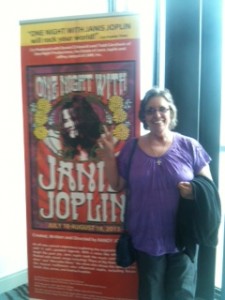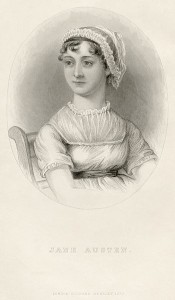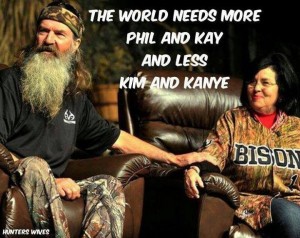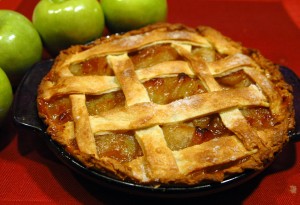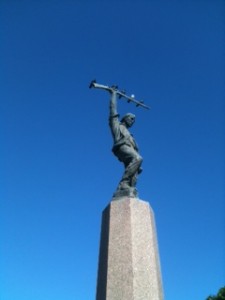Fifty years ago today, I came home from ninth grade, and my mother intoned her usual, “What did you learn In school today?” For once my answer came easily. I had to come up with an answer to that question every day. Sometimes I couldn’t think of anything special I’d learned, so I’d make something up. It didn’t seem to matter to them.
“I saw President Kennedy today. His motorcade went right by our school on Broadway, and they had us all stand on the curb and wave. He looked orange.”
“Was Jackie with him,” she asked, mildly interested for once.
“Yes. She didn’t look orange. She looked normal.”
I never found out why the President of the United States looked orange that day, or if he always looked orange. Maybe it was make-up, maybe it was a bad artificial tan—they tended to turn you orange back then—but I remember that very clearly, my main impression of the two-second look I got of John Kennedy on his way to the Alamo to make a speech.
When my father came home later, he asked me the same question, “What did you learn in school today?”
“She saw Kennedy today,” my mother interrupted before I could get it out.
My father made a sound somewhere between a growl and a spit. He hated John Kennedy for his liberalism, his privileged background, and apparently most of all for his accent. Daddy thought Kennedy had to be talking like that on purpose, putting on airs or something, because nobody talked like that naturally.
During the campaign three years before, my father pointed out to me a poem that appeared in the local newspaper:
Since Kennedy says “hawf,” then Johnson must agree,
That a Texas calf is now a “cawf,” as any fool can see.
So when you go to the butcher’s, do not snicker and “lawf,”
Just go up and say, to be quite genteel,
“Please give me hawf a cawf.”
We all got a good “lawf” about that. My father’s politics, which were slightly to the right of Attila the Hun, meant he hated Kennedy as he had hated Franklin Roosevelt before him. Only 2/3 into his first term, Kennedy had had less time to incur his wrath, but he couldn’t stand him, end of conversation. I was still quite young, fourteen in 1963, and generally parroted my parents’ political opinions. It would be several years before I began to think for myself. From that time on, our conversations were limited to old times, and, like a Jane Austen novel, the weather and the condition of the roads.
The next day started off like any other, but after lunch our principal came on over the public address system. He announced that apparently someone had shot the president in Dallas. Using the cutting edge of 1963 technology, he held his transistor radio up to the microphone on his desk to let us hear the radio broadcasts and updates. It was no time at all before we knew for sure he was dead.
Even today I can’t describe what I felt. I wasn’t devastated like the kids who had actually liked him. I didn’t cry. But I definitely felt weird. It was the first time in my life when someone I had seen one day was dead the next. Things like that didn’t happen in my little world. Maybe during war or if you saw someone off on the Titanic, but people in my world didn’t just up and die. Not yet, anyway.
That night, as we watched the aftermath playing out on all three channels, my father expressed his sympathy. “Well, I hated the sonofabitch, but I didn’t necessarily want him to die.” All things considered, it was a real gush of emotion.
Like everyone else my age, I can’t believe it’s been fifty years since the assassination. That is the watershed event for my generation. Everyone remembers where they were when they found out about it, as my parents’ generation remembered hearing about Pearl Harbor, and my children will remember finding out about 911.The girl who was barely a teenager in 1963 has five grandchildren now. I wonder what their watershed event will be, whether there will be a place deep inside them that is permanently chilled by it, and whether they will write about it fifty years later.
